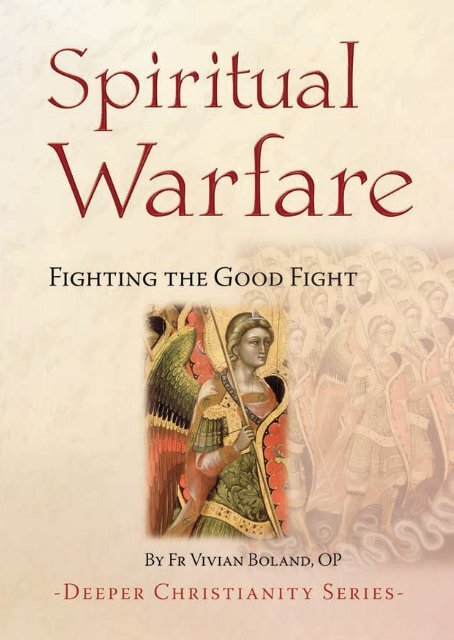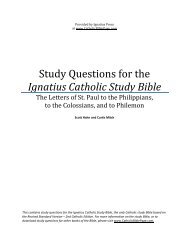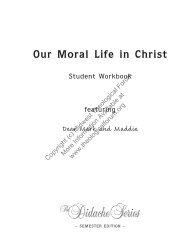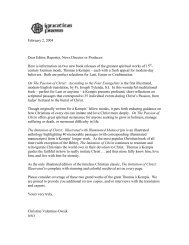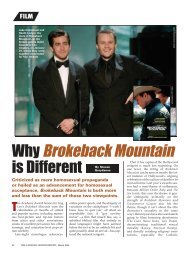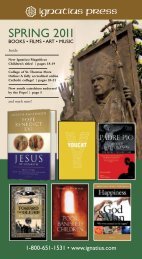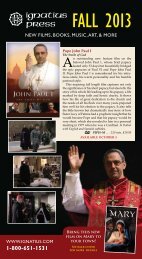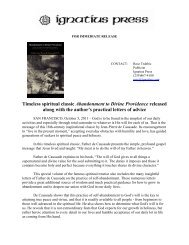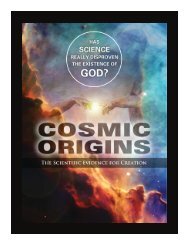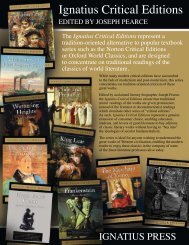Download PDF - Ignatius Press
Download PDF - Ignatius Press
Download PDF - Ignatius Press
You also want an ePaper? Increase the reach of your titles
YUMPU automatically turns print PDFs into web optimized ePapers that Google loves.
Catholic Truth Society Publications<br />
Distributed by <strong>Ignatius</strong> <strong>Press</strong><br />
Catholic Truth Society and <strong>Ignatius</strong> <strong>Press</strong> have joined<br />
forces to make CTS’s outstanding booklets available in North<br />
America. CTS booklets explain the faith, teaching, and life<br />
of the Catholic Church. They are based on Sacred Scripture,<br />
the Second Vatican Council documents, and the Catechism of<br />
the Catholic Church. These booklets provide authentic<br />
Catholic teaching; they address issues of life and truth which<br />
are relevant to all. They aim to inform and educate readers on<br />
the many issues that people have to deal with today.<br />
www.ignatius-cts.com<br />
All rights reserved. Copyright © 2007, The Incorporated<br />
Catholic Truth Society of London. Distributed in North<br />
America by <strong>Ignatius</strong> <strong>Press</strong>, San Francisco, CA.<br />
ISBN 978 1 86082 421 0<br />
Front cover image: The Heavenly Militia, c.1348-54<br />
(tempera on panel) by Guariento, Ridolfo di Arpo (c.1310 -<br />
c.1370) © Museo Civico, Padua, Italy/Alinari/The<br />
Bridgeman Art Library.
Spiritual<br />
Warfare<br />
Fighting the Good Fight<br />
by Vivian Boland OP<br />
All booklets are published thanks to the<br />
generous support of the members of the<br />
Catholic Truth Society<br />
CATHOLIC TRUTH SOCIETY<br />
PUBLISHERS TO THE HOLY SEE
Contents<br />
Introduction . . . . . . . . . . . . . . . . . . . . . . . . . . . . . . . . . . . .3<br />
The Struggle with Ourselves . . . . . . . . . . . . . . . . . . . . . .7<br />
Not Just Flesh and Blood . . . . . . . . . . . . . . . . . . . . . . . .22<br />
Wrestling with God . . . . . . . . . . . . . . . . . . . . . . . . . . . . .35<br />
Christ, Our Champion . . . . . . . . . . . . . . . . . . . . . . . . . .48<br />
2
Introduction<br />
I n 1589 an Italian priest, Lorenzo Scupoli (1530-1610),<br />
published a book called Spiritual Combat. In less<br />
than twelve months it was being used by St Francis de<br />
Sales, then a young student at Padua. Referring to it as<br />
his spiritual director, Francis treasured this book all his<br />
life, reading a passage every day and the whole book<br />
every month. Quickly translated into many languages, it<br />
joined Thomas à Kempis’ Imitation of Christ as one of<br />
the classic manuals of Catholic spirituality. Its success<br />
came from its simplicity, its practical character, and the<br />
way in which its teaching rang true, forged as it was in<br />
the crucible of Fr Scupoli’s personal suffering. John<br />
Henry Newman (1801-1890) used it, especially in the<br />
years of his conversion, and it helped form the spiritual<br />
life of Blessed John XXIII (1881-1963) when he was a<br />
young seminarian at Bergamo. Nicodemos the Hagiorite<br />
(1748-1809), one of the editors of the Philokalia, the<br />
standard collection of spiritual writings of Eastern<br />
Orthodoxy, adapted it for Orthodox Christians.<br />
In recent years Scupoli’s work is not so well known,<br />
perhaps because the themes of self-denial, self-distrust,<br />
and even doing violence to oneself in order to follow<br />
3
Christ, trouble rather than encourage people. But any<br />
serious spiritual teaching involves discipline and the<br />
practice of asceticism, a readiness to engage in the<br />
struggle with oneself, with the powers of the spiritual<br />
world, and with the mystery of how we come to prefer<br />
God’s will to our own. In each of the gospels Jesus<br />
teaches that those who want to follow him must deny<br />
themselves and take up their cross, and that those who<br />
lose their life for his sake will find it (Mt 16:24-25; Mk<br />
8:34-35; Lk 9:23-24; Jn 12:25).<br />
In 1943 a French Jesuit, Henri de Lubac, wrote an<br />
essay called Spiritual Warfare. In this work the future<br />
Cardinal identifies the attack on it by the German<br />
philosopher Friedrich Nietzsche as the greatest<br />
contemporary challenge facing Christianity. For de<br />
Lubac this challenge was not just a political and<br />
philosophical one although it was that for sure - he<br />
writes in a France occupied and partitioned by the<br />
Nazis - it is also a spiritual and theological challenge.<br />
‘The Christian who wants to remain faithful’, he writes,<br />
‘can only reject with a categorical No a neopaganism<br />
that is constituted against Christ’ (page 500).<br />
The warfare in which the Christian must engage is on<br />
many levels, then, not just the personal moral and<br />
spiritual quest but also the social intellectual and<br />
political contest, what has more recently come to be<br />
4
called ‘the culture war’. It is worth noting that when used<br />
correctly the Arabic term ‘jihad’ has a similar range of<br />
meanings as Christians give to the ‘spiritual warfare’.<br />
The so-called ‘Greater Jihad’ refers to the personal<br />
spiritual struggle to be ever more faithful to God.<br />
The language of combat and warfare is not<br />
fashionable in spirituality or theology today. It is clearly<br />
open to misunderstanding and abuse. Yet there are<br />
many places in the New Testament where the Christian<br />
life is presented in just these terms, as warfare (2 Co<br />
10:4), struggle (Ph 1:30; Col 1:29; Heb 10:32; 12:4), a<br />
fight (1 Tm 1:18), an athletic contest or agonia (1 Co<br />
9:24), a boxing-match with oneself (1 Co 9:27), a<br />
readiness to kill things in ourselves and in our<br />
relationships (Rm 8:13), a conflict between good and<br />
evil (Jn 5:29; Rm 7:21), light and darkness (Lk 11:34-36;<br />
Jn 3:19), truth and falsehood (Jn 8:44), life and death<br />
(Rm 6:13,23). In this conflict we are participants and<br />
not just spectators, agents but also victims dependent<br />
on the power of Christ if we are to survive it. In 1996<br />
John Paul II wrote that spiritual combat is ‘a demanding<br />
reality which is not always given due attention today’<br />
(Vita consecrata § 38).<br />
At the moment in which a person asks to be<br />
admitted to the Church as a catechumen he or she is<br />
asked to reject ‘every power which sets itself up in<br />
5
opposition to God and his Christ’ as well as ‘every form<br />
of worship which does not offer God true honour’.<br />
Soon after this the catechumen receives the exorcisms<br />
and is reminded that the spiritual life is a battle<br />
between flesh and spirit, that self-denial is needed if<br />
we are to gain the blessings of the Kingdom of God,<br />
and that God’s help is needed continually. The prayers<br />
of exorcism refer to evil spirits, to falsehood and sin, to<br />
all forms of immorality, to the tyranny of the enemy, to<br />
the spirit of falsehood, greed and wickedness, to the<br />
spirit of selfishness and greed, of pleasure and worldly<br />
pride. The person is then anointed with the oil of<br />
catechumens, an athlete’s oil to strengthen them for<br />
the contest. Baptism is the beginning of a struggle,<br />
more or less severe according to God’s providence, that<br />
ends only at the moment of death.<br />
This booklet does not pretend to emulate either<br />
Scupoli or de Lubac. All that is attempted is a survey of<br />
the theme of spiritual warfare in the Bible. This is done<br />
in four parts: the struggle with ourselves, with powers<br />
that are ‘not just flesh and blood’, and with God, and a<br />
reflection on how these aspects of Christian spiritual<br />
warfare are embraced and resolved in the work of Jesus<br />
Christ, our leader and victorious champion.<br />
6
The Struggle<br />
with Ourselves<br />
A Threefold Tempation<br />
In its account of the original sin, the Book of Genesis<br />
tells us that the human beings decided to take the<br />
fruit for three reasons:<br />
● because it was good to eat<br />
● because it was pleasing to the eye<br />
● because they judged it desirable for the<br />
knowledge it could give.<br />
These phrases from Genesis 3:6 are echoed towards<br />
the end of the Bible in the First Letter of Saint John. All<br />
that is in the world, it says,<br />
● the lust of the flesh<br />
● the lust of the eyes<br />
● the pride of life<br />
is not of the Father but is of the world (1 Jn 2:16).<br />
These are the attractions of transgression, the factors<br />
that make sin possible.<br />
7
The Bible seems to offer us a threefold pattern of<br />
temptation, then, and not just in these two texts. The<br />
temptations of Jesus can be interpreted according to this<br />
pattern (Mt 4:1-11; Mk 1:12-13; Lk 4:1-13). One is about<br />
feeding his hunger, a lust of the flesh. Another is about<br />
displaying his power, a lust of the eyes, something to<br />
impress. And the third is about taking on God, putting<br />
God’s wisdom to the test, and standing over against God<br />
somehow, being as wise as, even wiser than, God.<br />
The Book of Deuteronomy speaks of the paths to sin as<br />
● a straying heart<br />
● surrender to idolatry<br />
● a refusal to listen (Dt 30:15-20)<br />
and the Book of Sirach warns us against<br />
● following passion<br />
● giving our hearts to money<br />
● saying ‘I am self-sufficient, who has authority<br />
over me’ (Si 5:1-8).<br />
It seems, that this threefold pattern does structure the<br />
universal human experience of temptation. What<br />
touches us deeply attracts us powerfully,<br />
● firstly the desires and needs of the body<br />
● secondly what is pleasing and delightful<br />
whether in our own eyes or in the eyes of others<br />
8
● thirdly the desire for knowledge and the power<br />
and autonomy it brings.<br />
What tempts the human being are the satisfaction of<br />
bodily needs, perhaps to the point of indulgence;<br />
having some standing in the world through the things<br />
one possesses that are admired by others; and taking<br />
control of one’s life, becoming wise in one’s own<br />
estimation, to the point of not needing anybody else,<br />
even God. There is much to be gained from meditating<br />
on this threefold pattern.<br />
The Christian Triangle<br />
Another way of thinking about this is to say that the<br />
temptations that come our way will inevitably concern<br />
● relating to self<br />
● relating to others<br />
● relating to God.<br />
If we think of these as the three corners of a triangle,<br />
then we can say that it is within this triangle that the<br />
Christian is called to live, remembering always God,<br />
others and self. If we remember one of these to the<br />
exclusion of the other two, or we remember two to the<br />
exclusion of the third, then we are not remembering all<br />
that needs to be thought about as we reflect on our<br />
following of Christ.<br />
9
Spiritual warfare, the struggle against sin and<br />
temptation, involves battles at each corner of this triangle,<br />
sometimes in relation to oneself, sometimes in relation to<br />
the challenges posed to us by others and our dealings<br />
with them, sometimes with regard to God. The Christian<br />
tradition has fixed on seven deadly sins, pride,<br />
covetousness, lust, anger, gluttony, envy and sloth. Each of<br />
these attacks one or more corners of this triangle, our<br />
relationship with God, with others, or with ourselves. The<br />
major spiritual battles in which we find ourselves<br />
engaged, whichever deadly sin they are about, involve all<br />
three corners of the triangle. No aspect of Christian life is<br />
adequately considered without constantly remembering<br />
all three. The great commandment that summarises the<br />
duties of the Christian life makes this clear:<br />
You shall love the Lord your God with all your<br />
heart, and with all your soul, and all your mind.<br />
This is the great and first commandment. And a<br />
second is like it, You shall love your neighbour as<br />
yourself (Mt 22:37-39).<br />
Any aspect of Christian life - say reconciliation and<br />
forgiveness - cannot be established if we neglect any<br />
corner of the Christian triangle. When they think about<br />
forgiveness and reconciliation people tend to think first<br />
of their relationship with others. But difficulties<br />
10
experienced in that corner of the triangle might well<br />
find at least part of their explanation in one of the other<br />
corners, for example in the fact that there are ways in<br />
which people cannot forgive themselves, or even that<br />
there are things about which they cannot forgive God.<br />
Inability to forgive ourselves gets in the way of our<br />
ability to forgive others. Lorenzo Scupoli is realistic and<br />
encouraging in telling us that we will sin, so the thing to<br />
do is simply acknowledge our failure, ask forgiveness<br />
and help from God, and get on with things.<br />
Inability to forgive God is more complex. If it is<br />
accepted that we might on occasion be angry with God,<br />
then it seems acceptable also to think that there might<br />
be ways in which we find it difficult to forgive God. For<br />
what might we need to forgive God? Well, for being<br />
God when we are not, or for having His own will about<br />
our lives and for not revealing it more clearly to us (for<br />
so it seems to us most of the time). To say that there is<br />
no way in which I need to be reconciled not only with<br />
God but to God is to say that I understand his wisdom<br />
completely and that there is no room for the garden of<br />
Gethsemane in my relationship with God.<br />
When we reflect on temptation and its roots we<br />
quickly find ourselves recognising this triangle. To reflect<br />
adequately on living the Christian life I need to think not<br />
only about myself and others but also about God, not<br />
11
only about myself and God but also about others, not<br />
only about others and God but also about myself.<br />
The Weapons of this Warfare<br />
The threefold asceticism of Lent, which is the threefold<br />
asceticism of the Christian life at any time, consists of<br />
almsgiving, prayer and fasting (Mt 6:1-18). Notice that<br />
the three corners of the Christian triangle are addressed<br />
in these practices<br />
● almsgiving concerns others<br />
● prayer concerns God<br />
● fasting concerns myself.<br />
Notice that we can also align these practices with the<br />
threefold structure of temptation identified earlier. The<br />
attractions of transgression are the lust of the flesh, the<br />
lust of the eyes and the pride of life (1 Jn 2:16), what is<br />
good to eat, pleasing to the eye and promises wisdom<br />
(Gn 3:6). These things are not in themselves our<br />
enemies but they are the things that most easily turn<br />
against us when we pursue them disproportionately.<br />
How are the classical ascetical practices the antidote<br />
to temptation?<br />
● fasting and other disciplines of self-denial help<br />
us to manage the desires of the flesh in ways<br />
that are appropriate to our true needs as well as<br />
to our commitments and relationships<br />
12
● almsgiving and other practices of charity and<br />
justice-making help us to manage our<br />
relationships with others, our standing in the<br />
world and our evaluation of what is important<br />
in regard to possessions, reputation and<br />
achievement<br />
● prayer and other acts of the virtue of religion -<br />
adoration, devotion and sacrifice - sustain our<br />
relationship with God and help us appreciate<br />
that it is in God we live and move and have our<br />
being (Ac 17:28).<br />
There is a tendency now to value human beings<br />
simply for their capacity either to produce things that<br />
others can consume or to consume things that others<br />
have produced. There are many reasons for this not<br />
least the fact that the economic system that prevails<br />
requires the constant creation of new needs and of<br />
new products to meet those needs. Economic<br />
prosperity seems to depend on it: that what would<br />
have been considered a luxury before, or would not<br />
have even been thought of, is now a necessity. The<br />
ascetical disciplines of fasting and almsgiving oblige<br />
us to think again about this way of valuing humanity<br />
just as they help us to develop the virtues needed to<br />
resist it.<br />
13
Fasting<br />
Over indulgence in food and drink is always possible and<br />
it is often easier to find excuses for it than to recognise it<br />
simply as temptation. If we give ourselves over to the<br />
culture of blaming and litigation, of complaining and<br />
standing on one’s rights, we run the risk of losing a sense<br />
of being blessed, the awareness of creation as a gift from<br />
a gracious God. A proper appreciation of the good things<br />
of the earth must include recognising where they come<br />
from, discerning how they are to be wisely used and<br />
remembering that there are other people in this world<br />
whose basic needs (food, water, shelter) are not being<br />
met while we are satisfying imaginary needs. Fasting<br />
cannot be simply a personal challenge to see if we can<br />
meet certain spiritual targets, a visit to a kind of spiritual<br />
gymnasium. Modesty in our intake of food and drink,<br />
and even abstinence from them, supports concentration<br />
and meditation, reminds us of the needs of others, and<br />
helps us to acknowledge the gifts of God.<br />
John Paul II reminded consecrated religious of their<br />
need to rediscover the ascetical practices typical of the<br />
spiritual tradition of the Church. These are powerful<br />
aids to authentic progress in holiness, he said, helping<br />
to master and correct the inclinations of human<br />
nature wounded by sin, indispensable if we are to<br />
remain faithful and follow Jesus on the way of the<br />
cross (Vita Consecrata §38).<br />
14
Almsgiving<br />
When Jesus speaks of almsgiving he warns against<br />
doing it in a way that draws attention to ourselves. The<br />
temptation of what is delightful to the eyes is not just<br />
about physical beauty that might arouse our lust but<br />
about how we want to appear to others, how we wish to<br />
be seen. It is about power and autonomy, being<br />
influential and recognisable, being in a position to help<br />
others and make them indebted to us. There are great<br />
dangers here and the virtues we need to resist them are<br />
those associated with justice: gratitude, respect,<br />
humility, truthfulness, generosity, as well as justice<br />
itself. We give alms to others not only by giving them a<br />
handout but also by respecting their property, by<br />
honouring their good name and reputation, by seeking<br />
to be honest in regard to their gifts and failings (as well<br />
as our own). In a world obsessed with fame and<br />
celebrity, with how people seem rather than how they<br />
are, there is more need than ever for followers of Jesus<br />
to be humble, comparing themselves only with God<br />
and thereby recognising their nothingness as well as<br />
their greatness.<br />
The desire to count for something, to find one’s place<br />
in the sun, even to have authority over others, can be as<br />
powerful as the desire for food or drink or sex. Who<br />
can survive being praised, the Book of Proverbs<br />
15
wonders (27:21). Who can stand up to riches, the Book<br />
of Sirach asks (31:10; see 1 Tm 6:10). There is nothing<br />
to be done except to engage in the combat these desires<br />
force on us. We must get involved in this combat if we<br />
are to remain directed towards our goal, if we are to<br />
continue to grow in the life Jesus gives us.<br />
Prayer<br />
If fasting seeks to manage the lust of the flesh and<br />
almsgiving the lust of the eyes, we can think of prayer<br />
as the Christian antidote to the pride of life. The<br />
original sin of pride is the decision to go it alone and to<br />
seek wisdom apart from God. To pray is to<br />
acknowledge our need of God. Another tendency of<br />
our time is to regard independence and autonomy as<br />
simply good, dependence and neediness as simply bad.<br />
But our situation is one of dependence and neediness:<br />
on parents and teachers, family and nation, friends and<br />
colleagues. Secular humanism fears that God is a threat<br />
to humanity, that we cannot be truly free until we shake<br />
off God. Adam and Eve, in seeking to be wise apart<br />
from God, are the original secularists. Christian<br />
humanism knows that the truth is directly contrary to<br />
this: Christ, who is the head of humanity, leads it not<br />
towards destruction but towards flourishing. Prayer is<br />
the fresh air in which the Christian lives and blossoms.<br />
16
To submit our life to God in prayer is neither<br />
humiliating nor cowardly: it is simply truthful and<br />
spiritually healthy. To give up on prayer is to enter a<br />
place of loneliness and sadness. To persevere in the<br />
struggle of prayer requires courage but is the way saints<br />
are made.<br />
Another Three: Poverty, Chastity, Obedience<br />
Another act of the virtue of religion is the taking of<br />
vows and it will not come as a surprise to suggest that<br />
the three vows of religion may also be aligned with the<br />
threefold structure of temptation and the threefold<br />
asceticism of fasting, almsgiving and prayer. The vow of<br />
chastity seeks to manage the lust of the flesh, to order<br />
the fulfilment of physical desires, and to counter the<br />
deep-rooted tendency that leads us to focus on self to<br />
the exclusion of others and God. Poverty seeks to<br />
manage the lust of the eyes, to order our desire for<br />
cutting a dash and making an impression, and to<br />
counter the tendency to find our sense of identity in<br />
what we own or in what we manage to achieve.<br />
Obedience seeks to manage the pride of life, to order<br />
our involvement in God’s plan in a way that is<br />
according to His will and not our own, and to counter<br />
the tendency to go it alone, to fall back on our own<br />
plans for our life and so miss the depth of what God’s<br />
17
love has in mind for us. The names of these vows are<br />
also names of virtues that ought to characterise the<br />
lives of all Christians in ways appropriate to their<br />
relationships and commitments. Anyone who follows<br />
Christ must be poor, chaste and obedient. In publicly<br />
making profession of these vows, religious thus become<br />
a witness and sign to the Church as a whole of its own<br />
deepest reality and calling.<br />
The Usefulness of Temptation<br />
In the Bible temptation most often refers to a testing of<br />
the human heart by God. According to the Book of<br />
Proverbs<br />
the crucible is for silver, and the furnace is for gold,<br />
and the Lord tries hearts (17:3; see also 3:12; 27:21).<br />
The Book of Sirach says<br />
My son, if you come forward to serve the Lord,<br />
prepare yourself for temptation. Set your heart<br />
right and be steadfast, and do not be hasty in time<br />
of calamity (2:1).<br />
God weighs human hearts and tests them to see what<br />
they are made of (Ps 7:9; Jr 12:3; 1 Th 2:4). Why would<br />
God do this? In order, it seems, to purify our hearts so<br />
that we can love with greater integrity; in order also, it<br />
18
seems, to make human hearts grow bigger so that we<br />
can love more. God tests people in order to refine<br />
them: Jr 6:27; 9:7; Zc 13:9; Ps 66:10; Is 48:10; 1 P 1:7; Ws<br />
3:5; Sr 2:5.<br />
Temptation is then a necessary part of life with God,<br />
something potentially useful and helpful to us. St Luke<br />
points out that it was the Holy Spirit who led Jesus into<br />
the wilderness to be tempted/tested by the devil. The<br />
First Letter of Peter says we are not to be surprised at<br />
the ‘fiery ordeal’ that tests us as if something strange<br />
were happening to us (1 P 4:12; see 1 Co 10:13). God<br />
tests individuals (2 Ch 32:31; 2 Co 9:13) or the entire<br />
people (Ex 16:4; Dt 8:2, 16; Jg 2:22) often using the<br />
nations and other instruments (Dt 13:3; Jg 3:1,4; Jdt 8:25;<br />
Ps 11:5).<br />
Temptation helps us to know what we really stand<br />
for. Only by facing options and making decisions do we<br />
come to know what it is we really value and where our<br />
hearts are really given. The struggle with temptation<br />
brings about a growth in self-knowledge. We learn<br />
about our weaknesses and blind spots, about the depth<br />
of our commitments and about the extent to which we<br />
are ready to serve God. In practice it is only through<br />
temptation that we come to distinguish what we really<br />
value from what we think we value. The struggle with<br />
temptation helps to clarify this difference for us.<br />
19
It is easy to be virtuous when we have no choice.<br />
Faced with the choices that temptation offers we can,<br />
by choosing wisely and well, grow in virtue. St Teresa of<br />
Avila says that love is seen, not if it is kept hidden in<br />
corners but in the midst of the occasions of falling.<br />
Temptation then helps us to set our hearts right and to<br />
purify our loving by giving ourselves clearly and<br />
decisively to what is of real value.<br />
Temptation usually involves struggle and difficulty,<br />
perhaps even blood, sweat and tears, but through such<br />
suffering we grow. Rather than shrinking us by limiting<br />
our options, our survival of temptation helps us to<br />
become greater and bigger than we were. The experience<br />
of struggling with it will mean that we will not be hasty<br />
in time of temptation but will grow in that calm wisdom<br />
which is a hallmark of holiness. Temptation hones the<br />
spirit and moral character of the human being:<br />
Blessed is any one who endures temptation. Such<br />
a one has stood the test and will receive the crown<br />
of life that the Lord has promised to those who<br />
love him (Jm 1:12; see also 1:3).<br />
Temptation is, therefore, useful although the<br />
outcome of our struggle is not guaranteed. The value of<br />
the temptations of Jesus for us is in the knowledge that<br />
what we go through, he has gone through already. And<br />
20
as we go through it we have his help, strength and life<br />
to support us. The ascetical practices of fasting,<br />
almsgiving and prayer already strengthen us in virtue<br />
and prepare us for temptation. In Lent we turn our<br />
minds to the testing and training that Christian life<br />
requires but Lent serves simply to recall us to things<br />
that ought to mark our life always: honestly facing up to<br />
what it is we really value, and growing (even with some<br />
pain) in the faith and love of the Lord.<br />
In his Spiritual Combat, Scupoli identifies four ‘most<br />
sure and necessary weapons’ in the spiritual warfare<br />
against self<br />
● distrust of oneself<br />
● trust in God<br />
● spiritual exercises<br />
● prayer.<br />
Distrust of self and trust in God is an attitude quickly<br />
noted and discussed by him (chapters 2-6) but<br />
fundamental to his spiritual teaching. Thinking about<br />
the weakness of our nature in the face of temptation is<br />
already sufficient to encourage us to distrust self and<br />
trust God. When we recall that our struggle is with<br />
more than flesh and blood we are encouraged even<br />
further in this direction. It is to this aspect of spiritual<br />
warfare that we now turn.<br />
21
Not Just Flesh<br />
and Blood<br />
Cosmic Battle<br />
In the first chapter we proposed a triangular model for<br />
the spiritual struggle: temptation has three aspects<br />
(lust of the flesh, lust of the eyes, pride of life), there is a<br />
triangle in which we must live (relating to self, others,<br />
God), the classical works of asceticism are three (fasting,<br />
almsgiving, prayer), and the vows of religion, seeking to<br />
confront directly the threefold root of sin in us, are also<br />
three (chastity, poverty, obedience). But our struggle, as<br />
St Paul says in the Letter to the Ephesians, is not just<br />
with flesh and blood ‘but against the principalities,<br />
against the powers, against the world rulers of this<br />
present darkness, against the spiritual hosts of<br />
wickedness in the heavenly places’ (Ep 6:12). This is why<br />
the Christian, if he or she is to remain standing in the<br />
evil day, must ‘put on the whole armour of God in order<br />
to stand against the wiles of the devil’ (Ep 6:11,13).<br />
There is any number of New Testament texts that<br />
speak about these spiritual hosts and about the struggle<br />
22
with them in which we are also involved. We do not<br />
have to turn to the Book of Revelation for the gospels<br />
themselves are full of this cosmic drama. In his ministry<br />
Jesus is not only a teacher and a healer, he is also an<br />
exorcist come to take on and to overpower the spirits of<br />
evil and sin, of sickness and death. The demons<br />
themselves recognise him as one more powerful than<br />
themselves. Reading through the narratives of the<br />
passion in all four gospels it is clear that things are<br />
happening not just on the level of the relationship<br />
between Jesus, the Father and ourselves, and not just on<br />
the political level of conflict and misunderstanding<br />
between Jesus, the Jewish leaders and the Romans, but<br />
intertwined with those, spiritual warfare in another<br />
sense is under way, a conflict between the kingdom of<br />
this world and the kingdom of God, involving realities<br />
that are beyond human beings but that are of crucial<br />
importance for us.<br />
St Luke concludes his account of the temptations of<br />
Jesus by telling us that the devil departed from him<br />
‘until an opportune time’ (Lk 4:13). That opportune<br />
time, the ‘hour’ of which Jesus often speaks, is the time<br />
of his passion, death and resurrection. The hour of<br />
Jesus is the hour of the paschal mystery through which<br />
we are redeemed. At the beginning of the account of<br />
Jesus washing the disciples’ feet St John tells us that ‘the<br />
23
devil had already put it into the heart of Judas Iscariot<br />
to betray him’ (Jn 13:2). The time has come for the<br />
showdown. As it unfolds, it seems that darkness is<br />
triumphant and the prince of darkness has conquered<br />
yet again. Jesus is condemned, is crucified and dies on<br />
the cross. But God’s power reaches even into the<br />
kingdom of death, the last enemy of humankind (1 Co<br />
15:26), and the swallowing up of Jesus by death<br />
becomes the hour of the triumph of God’s glory. The<br />
Father’s only Son, freely accepting his death and having<br />
dwelt among the dead, is raised by the Father’s power in<br />
the glory of the resurrection. His victory means new<br />
and eternal life for us.<br />
The Invisible Creation<br />
Whenever we say the Creed we express our faith in God<br />
as Creator of heaven and earth, and ‘maker of all things<br />
visible and invisible’. How are we to understand this<br />
reference to the invisible creation? It means things<br />
invisible in themselves, not just invisible in the sense of<br />
not yet having come within our line of vision. Past or<br />
future events on this earth are invisible in that sense -<br />
we cannot witness them - but we know that the Creed<br />
means something more than this. It refers to immaterial<br />
creatures, made by God but spiritual and not physical.<br />
In the great hymn to Christ in the Letter to the<br />
24
Colossians we read that ‘all things were created in him,<br />
through him and for him, in heaven and on earth, visible<br />
and invisible, whether thrones or dominions or<br />
principalities or authorities’ (Col 1:16). The hymn is<br />
worth quoting in full and repays constant meditation:<br />
God has delivered us from the dominion of darkness<br />
and transferred us to the kingdom of his beloved Son,<br />
in whom we have redemption through the forgiveness<br />
of sins.<br />
He is the image of the invisible God<br />
the firstborn of all creation<br />
for in him all things were created<br />
in heaven and on earth<br />
visible and invisible<br />
whether thrones or dominions<br />
or principalities or authorities -<br />
all things were created through him and for him.<br />
He is before all things<br />
and in him all things hold together<br />
He is the head of the body, the church.<br />
He is the beginning, the firstborn from the dead,<br />
that in everything he might be pre-eminent. For in<br />
him all the fullness of God was pleased to dwell,<br />
and through him to reconcile to himself all things,<br />
whether on earth or in heaven, making peace by<br />
the blood of his cross (Col 1:13-20).<br />
25
Notice that another point is quickly made, not only<br />
that there is an invisible creation but that, however we<br />
think of it, it does not fall outside the work of Christ.<br />
Christ is the firstborn of creation and everything that is<br />
created, whether visible or invisible, is created in him,<br />
through him and for him. Likewise Christ is the<br />
firstborn from the dead, the beginning of the new<br />
creation. In making peace by the blood of his cross he<br />
has reconciled all things to himself, not only things on<br />
earth but also things in heaven.<br />
So we are not tempted to be Manichees. Manicheism<br />
is a recurring error that finds it easier to understand<br />
spiritual warfare - the battle between flesh and spirit,<br />
between evil and good - as a battle between two equal<br />
and opposing principles, the God who created the<br />
spiritual realm and another god who created the<br />
physical realm. St Augustine was persuaded by this view<br />
for a time until he came to see that evil too must fall<br />
within the plan and power of God. It is a more difficult<br />
teaching to understand, that the devil and his angels are<br />
creatures of God and not powers opposed to him on the<br />
same level as God. The powers of darkness, just as they<br />
do not fall outside God’s creating power, do not fall<br />
outside the work of God’s redemption in Christ, at least<br />
in the sense that they do not succeed in foiling that<br />
redemption. We are told that all things are made subject<br />
to Christ, all principalities and powers, even death itself,<br />
26
so that he can present an eternal kingdom to the Father<br />
when God will be all in all (1 Co 15:28; Ep 1:23). Evil<br />
does not have the last word and nor does sin or death.<br />
Sin is Behovely<br />
Julian of Norwich (1342-c.1420) tells us that Jesus<br />
revealed to her this strange fact, that ‘sin is behovely’. It<br />
means sin is fitting and appropriate, even in some sense<br />
necessary. It does not mean that sin is nothing: think of<br />
the suffering it causes, Julian says. But ‘sin is behovely’<br />
because God can make it serve His purposes.<br />
Paradoxically, those things that soil the glory of God are<br />
made to testify to that glory and mean it is more<br />
gloriously revealed. The liturgy of the Easter vigil puts<br />
it this way:<br />
O happy fault, O necessary sin of Adam, which<br />
gained for us so great a redeemer! [The original<br />
Latin says more: O certe necessarium Adae<br />
peccatum, quod Christi morte deletum est! O felix<br />
culpa, quae talem ac tantum meruit habere<br />
Redemptorem! O certainly necessary sin of Adam,<br />
which is cancelled by the death of Christ. O happy<br />
fault which gained such and so great a Redeemer.]<br />
A contemporary theologian who has written much<br />
about this mystery of the victory of Christ over sin and<br />
27
evil is Hans Urs von Balthasar (1905-1988). Basing<br />
himself not only on texts of the New Testament such as<br />
the hymn in Colossians 1, but also on the experiences<br />
of Christian mystics, including his friend Adrienne von<br />
Speyr, Balthasar believes Christians are obliged to hope<br />
for the salvation of all. We cannot claim to know either<br />
that all are saved or that some are lost for the<br />
judgement belongs to God. But the commandment to<br />
love all obliges us to hope for the salvation of all. The<br />
moment in the paschal mystery that illustrates the truth<br />
of this doctrine is the descent of Christ into hell. What<br />
does it mean to say that ‘He descended into Hell’? It<br />
means that the victory of Jesus reaches all corners of<br />
creation, even the darkest ones. There is no created<br />
place, time or experience that has not been touched by<br />
His redeeming power.<br />
Angels and Demons<br />
Our minds naturally ask the question ‘what kinds of<br />
being are we talking about when we speak of spiritual<br />
creatures whether good or bad’. Some might be tempted<br />
to avoid the issue by saying that this way of thinking<br />
belongs to a cosmology we have outgrown (an<br />
underworld, a world and an overworld) and that the<br />
powers and principalities Jesus tackled are better<br />
explained in psychological, sociological or other terms.<br />
28
After all, people often talk about struggling with their<br />
‘inner demons’ and we know they are talking about<br />
psychological and moral battles. People talk about the<br />
power of invisible things like ‘the market’ or<br />
‘institutionalised prejudice’ or ‘the atmosphere in the<br />
group’, realities that are in themselves invisible but<br />
whose effects and consequences are all too visible.<br />
There are impersonal things that are powerful in our<br />
world, though the Church has difficulty in accepting<br />
that there can be social sins in the strict sense whose<br />
evil is not attributable to individual human moral<br />
agents. But Christianity has always believed also in the<br />
reality of spiritual beings active within creation for<br />
good and for ill, in ways that are relevant to us and to<br />
our relationship with God.<br />
A moment’s reflection on our personal experiences of<br />
struggle in trying to live the Christian life will confirm<br />
that we are up against forces stronger than ourselves.<br />
Scupoli is in no doubt that the devil is active in trying<br />
to prevent and confuse our efforts to follow Christ<br />
more faithfully (Spiritual Combat chapters 16, 23, 27-<br />
32). John Paul II speaks of the ‘diabolical deceit’ that<br />
causes some evils to present themselves under the<br />
appearance of good (Vita consecrata §38). The devil<br />
uses things, people and events against us but only<br />
because God allows him to test us (Rv 2:10).<br />
29
Nevertheless, St Paul expresses concern that the<br />
tempter might try us too hard (1 Th 3:5) and Jesus<br />
teaches us to pray that we not be led into temptation<br />
(Mt 6:13).<br />
The Jesuit theologian Karl Rahner (1904-1984),<br />
writing about a ‘theology of sleep’, speaks about the<br />
supernatural battles that take place over the beds of<br />
sleeping Christians. Things happen in the course of the<br />
night. The Bible speaks of God revealing things in<br />
dreams. God’s people are then more vulnerable to<br />
spiritual interference, a fact that is recognised in the<br />
liturgy of Compline, the prayer that seeks God’s<br />
protection from the dangers of the night.<br />
But even when awake we may be conscious of the<br />
interference and distraction of spiritual powers that are<br />
in us but not of us. In his Letter to the Romans St Paul<br />
makes the startling statement, ‘I do not understand my<br />
own actions’ (7:15). ‘I do not do what I want’, he<br />
continues, ‘but do the very thing I hate. I can will what<br />
is right but I cannot do it. For I do not do the good I<br />
want, but the evil I do not want is what I do. Now if I do<br />
what I do not want, it is no longer I that do it, but sin<br />
which dwells within me’ (Rm 7:15,18-20). This is very<br />
re-assuring, at least in helping us understand the reality<br />
of our struggle. In the story of Adam and Eve it is<br />
likewise re-assuring that there we see the presence and<br />
30
End of booklet sample. Find more and order online:<br />
http://www.ignatius-cts.com/


